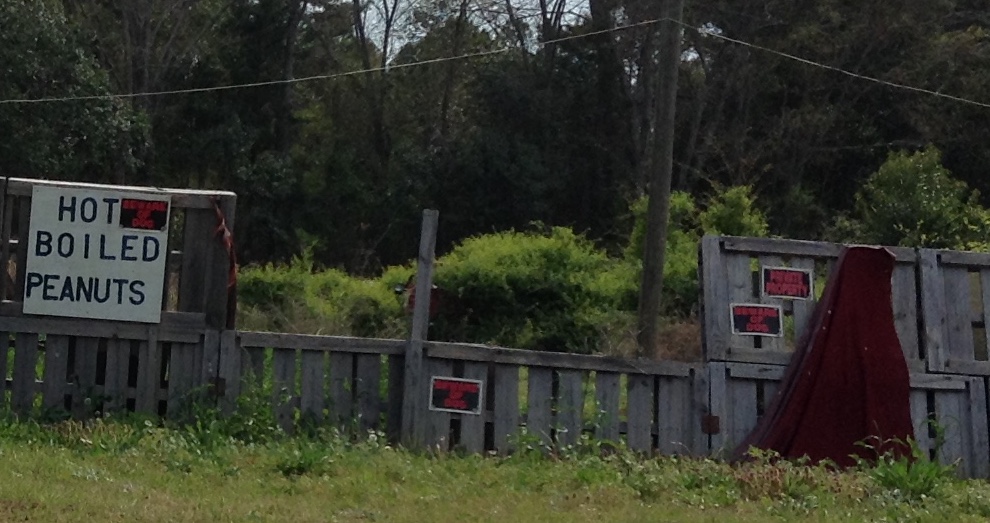
To preview audio or purchase a copy of this album follow this link
I’m crazy about history and genealogy research! Every now and then I’ll run into a person who is like-minded, but not very often. I’ve seen MANY people roll their eyes when somebody starts in on names of dead folks and dates of events from the past. I didn’t want this album to be a history lesson. I read tons of history from North Georgia but I didn’t even keep a list of all my sources. Instead of making this thing academic and potentially mind numbing for some people, I decided to learn some stuff myself and then see what kind of songs would come out over a few months time from the stuff I’d learned that stuck with me. There were more songs that came out than just the ones on this recording. These are just the ones that made the final cut because I felt they were better songs for one reason or another or because they seemed better suited to the recording process. History is everywhere (and I’m SO glad it is!). There is so much history out there that I couldn’t fit it all. So, if I’ve left out your favorite story from around these parts, I hope you won’t be too offended. I certainly wish I had time to make a song out of every single one of the stories from around here. While all of these songs are rooted in historic fact, I definitely used poetic license at times when I was writing the words. So, I also hope you won’t be offended if that’s not how you heard the story from someone else. Keep in mind that these are “songs inspired by Georgia history”, not songs of facts and dates from Georgia history. In essence, I studied the history and then opened myself up to letting the stories speak through me in what I hoped would be artistic and poetic song form. I’ll be glad to talk facts and dates with you and also do my best to provide you with sources for my information if you’ll send me an email. Since I am such a history buff and have family so deeply rooted in this part of Georgia, making this album was a labor of love for me. I hope you love it too. Happy listening!
Seven Tines
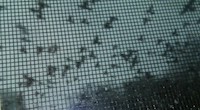
We’ve never lived anywhere we couldn’t hear a train’s whistle and a rooster’s crow. We and the trees welcome you to Georgia.
Lyrics:
Oh to live, where the train whistle blows- winged seed
Oh to live, where the cockerel crows- winged seed
A broken tine, a dew drop in the sun
A broken tine and I am done
Shagbark Hickory, Carolina Silver Bell
Ogeechee Lime tree, will tell it’s just as well
Birch branch by day, flagrant display when midnight’s gone- creosote breeze
Birch branch by day, North wind begin a witching song- creosote breeze
Repeat chorus
In matters of imagination, choose the poet for your guide
Then ask the King of Sweeten for a Sugar Maple ride
Shagbark Hickory, Carolina Silver Bell
Ogeechee Lime tree, will tell it’s just as well
Seven tines, a dew drop in the sun
Seven tines, I’m not done
Bowling Green
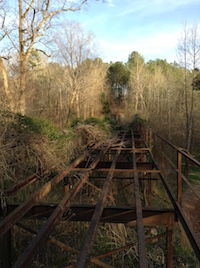
This song was inspired by a traditional Appalachian song by the same name that was probably written about Bowling Green, Kentucky. My first Potts grandfather who settled in Georgia in the late 1700’s lived in Bowling Green, Georgia. The Oglethorpe County town no longer exists but in its day, the little farming community was on a stage coach route and had a store, craft shops, a hotel, and a popular horse race track built by Ferdinand Phinizy.
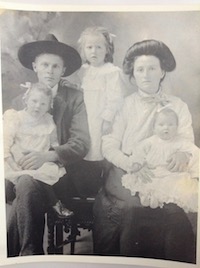
Bowling Green was located close to where Stephens, Georgia is now in Oglethorpe County. The only traces left of the town that I’m aware of today are the two old family cemeteries of a couple of the families who lived there in those days. I’ve actually read that Bowling Green was not only a place to see horse racing but that it was also known for all kinds of gaming. Back in those days, this could have meant activities like bull baiting, cock fighting, axe throwing, card playing, fist fights, etc. I like to imagine that it was a bit of a wild frontier town at one point. I see the character in this song being a wild sort of good ‘ol boy who has traveled away to do some migratory style work for a while. He’s acquired himself a horse he believes can win and he’s thinking about heading home soon to his girl and his exciting little horse racing town. I also have read that horse racing back in those days was quite dangerous and violent at times. Apparently lots of drinking occurred among spectators AND riders. I read one account of a rider falling off a horse and hitting a tree and completely crushing the bones in his face. My sixth great-grandfather, Moses Potts, had one of his sons die from falling off a horse in Bowling Green. Was he on Phinizy’s race track? Hmm…could have been….
Lyrics:
I wish I was in Bowling Green
Sittin’ in my chair
With my pocket full of harvest pay
My arm around my dear, my arm around my dear
Bowling Green, oh oh good ‘ol Bowling Green
If you see that gal of mine
Tell her once for me
I’m headed home and I ‘spect to die
In Oglethorpe County, In Oglethorpe County
Bowling Green, oh oh good ‘ol Bowling Green
I’m gonna show my turtle dove
High cotton when I’m back
I got me a swooper hoss
And Phinizy’s got the track, Phinizy’s got the track
Bowling Green, oh oh Good ‘ol Bowling Green
Oh I wish I was in Bowling Green
Sittin’ in my chair
With my pocket full of harvest pay
My arm around my dear, my arm around my dear
Bowling Green, oh oh good ‘ol Bowling Green
When the Boll Weevil Hit the Cotton
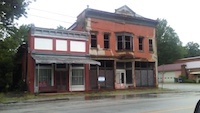
Cotton was Georgia’s main cash crop when the cotton-destroying Boll Weevil showed up in 1915, leading to a steady decline in production for the next sixty years. This scourge coupled with drought, along with erosion and flooding caused by years of mono-crop farming, lead to the withering of many thriving little Georgia cotton towns.
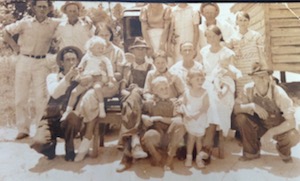
I must have heard my mom mention the boll weevil a million times throughout her life. She was born in rural Georgia in the 1930’s and both she and my father told me stories about how they picked cotton when they were kids, so I would imagine she saw one or two boll weevils in her day. This song turned out to be one of my favorites on the album. In the last year or so I found out that my 3rd great-grandparents lived in Maxeys, Georgia and are buried on the edge of town. That grandfather, Andrew Gillen, came to this country from Ireland. So I was on my way to Macon one day and, being the eccentric person that I am, I decided to stop at the cemetery in Maxeys where the Gillens are buried and sit next to their graves and play a few tunes on my Irish bouzouki. Well after I played a couple, I got an overwhelming feeling that I needed to leave immediately. I couldn’t ignore it. I packed up and got the heck out of there as quickly as possible. I drove into Maxeys proper and saw a sign that advertised coffee, tea, and history. I thought I’d like some of that so I pulled over and went inside. It turns out that I was just in time for a history tour. It was a tour that had been booked especially for a couple who were interested in the history of the area. The tour they were about to take was to the old Gillen’s Department Store. I told them that I was related to the Gillen family and the folks who had arranged the tour thought that was really neat and that it was a heck of a coincidence that I just unwittingly happened to show up right before they walked out the door to tour the old store. Gillen’s Department Store was owned by my 4th great uncle. I learned many facts that day that I never would have known about the family had I not happened to show up at exactly the right time. I learned that A.J. Gillen did very well for himself with this store and even opened his own bank next to it. But then the boll weevil hit the cotton and the economic chaos that ensued caused him to lose everything. From the experience I had on the tour that day, this song was born.
Here are some explanations for some of the words in the song:
- Thomasville, Georgia: The first place the boll weevil was detected in the state
- Dr. Durham: Here is a link to an article that tells you some about the Durham family and also about the couple who led the tour I happened upon that day https://www.onlineathens.com/local-news/2017-10-04/doctoring-history-maxeys-durham-home-added-historic-registry
- Broomsedge: That tall, wavy brown grass you see all over the place in Georgia. It usually grows on poor soil. There was lots of poor soil after all the cotton farming.
- Scull Shoals: Now a ghost town, this was once a textile mill village close to Maxeys.
- Shanty: Salmonville and Shanty were both early names for the town of Maxeys.
- ‘Ol Calhoun: The owner of a large plantation called Millwood. Supposedly he built structures on his land that were architecturally interesting in that they resembled boats. So this line was me having fun with words and history.
- Peanuts: Farmers were urged to plant peanuts in their cotton fields as a substitute cash crop when the boll weevil showed up.
- Silk in the Mulberry trees: In the early 1700’s it was very much hoped that the Georgia colony would prosper by being a major silk producer. Consequently, many white mulberry trees were planted. The queen of England was given a gown made of the first eight pounds of Georgia silk that was sent to England. But, despite valiant efforts, silk production never flourished in Georgia.
The lyrics for the bridge came from a deck of cards printed in England in the 1700’s. I learned about the cards from a book I read about James Oglethorpe, the founder of Georgia. I was also reading a Georgia history book by E. Merton Coulter around the same time, and he was saying that the idleness and poverty caused by the end of the cotton boom led the environs of the region to become somewhat lawless and morally bankrupt for a time. From some of the stories I’ve heard about my ancestors, I don’t doubt it.
Lyrics:
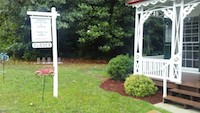
Finally that wave of evil reached Thomasville, Georgia
Started eatin’ away at the flowers and the buds
That news rang out like a Petersburg Bugle
Gillen’s bank closed down, the river choked in mud
When the boll weevil hit the cotton
This time Dr. Durham ain’t got no cure
When the boll weevil hit the cotton
Well it’s back to the Broomsedge and that’s for sure
When the boll weevil hit the cotton
No load for Scull Shoals in I don’t know when
When the boll weevil hit the cotton
Might as well call Maxeys Shanty town again
Now it’s one false move and your belly hits your backbone
‘Ol Calhoun warned us they’s gonna be a flood
Dad ‘n Mama’s drunk treading water in a field full of peanuts
With a yard full of toe headed urchins all caked in mud
Repeat Chorus
The poor when managed and employed in trade
Are to the public welfare useful made
But if kept idle from their vices spring
Whores for the stews and soldiers for the King
Repeat Chorus
Now that decadent canopy of southern glory’s
Turned into the spindly understory
Cut off at your knees
Still tryin’ to reach the silk in the Mulberry trees
Alexander and Cleveland
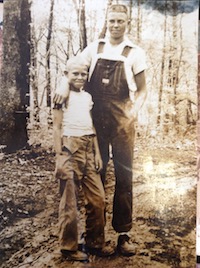
In the mid 1800’s there was a small town of Scottish immigrants at the fork of Cold Water Creek and the Savannah River. The long-gone little hamlet of Edinburgh, Georgia boasted a mill and a still.
Most of the lyrics and the melody to this song are taken from a song which is traditional among old-time players. I heard it very often in the North Carolina mountains where I used to live. Typically you hear it being called “Raleigh and Spencer”, but I have heard people call it by other names before. As with most folk songs, I’ve also heard people sing different variations of the lyrics. I’ve been playing the song for years and decided to bend it to my purposes on this album. It seemed like a fitting song because mostly what I was able to learn about Edinburgh, Georgia was that it had a mill and a still and was settled by a bunch of Scottish folks. I imagined those Scots working like heck all week and when Saturday rolled around they were ready to play fiddles, dance, and sample some of what they had been brewing in that still. Haha! One day, I went to where Edinburgh used to be. The town is gone. There is a granite marker there now saying that it was once a town. I wonder who put it there. I saw an old man while I was out that way who looked at me through his screen door like he might just shoot me for being a stranger. There was a house out there known as the Alexander-Cleveland house. It was built in the 1700’s and was considered by many to be the oldest structure in Elbert County. Unfortunately, it burned to the ground sometime after 1980. Normally this folk song says something like “Raleigh and Spencer are burnin’ down” like it’s referencing a couple of people. Well, there was an Alexander family and a Cleveland family out there where Edinburgh used to be but there was also an old house called the Alexander-Cleveland house, so I’m being a bit tongue in cheek when I say “Alexander and Cleveland’s a burnin’ down” since the house really burned.
Lyrics:
Alexander and Cleveland’s ‘a burnin’ down and
It’s Saturday night in Edinburgh town
Yes, it’s Saturday night in Edinburgh town
I’d pawn you my shoes for a little jug of booze
And a little sack of leaves to get by
Yes, a little sack of leaves to get by
I eat more chicken than a pretty gal can fry
And I’m still goin’ to Heaven when I die
Yes, I’m still goin’ to Heaven when I die
Alexander and Cleveland’s ‘a burnin’ down and
There’s so much liquor in this town
Yes, there’s so much liquor in this town
I’ll pawn you my watch and I’ll pawn you my chain
I’ll pawn you my silver wedding ring
Yes, I’ll pawn you my silver wedding ring
I eat more fat meat than you can cook in a week
And I’m still goin’ to Heaven when I die
Yes, I’m still goin’ to Heaven when I die
Alexander and Cleveland’s ‘a burnin’ down
And it’s Saturday night in Edinburgh town
Yes, it’s Saturday night in Edinburgh town
Wire Bridge
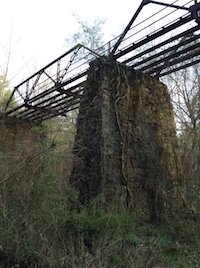
To shorten the travel time to his sweetheart’s house from thirty miles to five, Pearl Aycock built a bridge over the river in 1912 and connected Oglethorpe and Oconee counties in north Georgia. Inspired after reading about the steel wire suspension of the Brooklyn Bridge, Aycock designed his bridge and built it by hand with the help of family and friends. The 300 foot long and 32 foot high bridge was used by locals until 1932.
I first read about the Wire Bridge in a book about the history of Oglethorpe County. Around the same time I was reading the book, I discovered that some of my great-grandparents are buried out where the Wire Bridge used to be. Here is a link to a neat video with an actor telling the story while he portrays Pearl Aycock: https://www.youtube.com/watch?v=EH0IuTsmG28
Lyrics:
This is the moment we’ve been waiting for
I’ve built a path straight to your door
‘Cause it’s so hard for me so far away
Wanting you more every day
It took so long for me to go around
To cross that river and get to your town
Needed more love and needed more time
Shortest distance ‘tween two hearts is a straight line
So I will walk you home, across our wire bridge tonight
Yes I will walk you home, across our wire bridge tonight
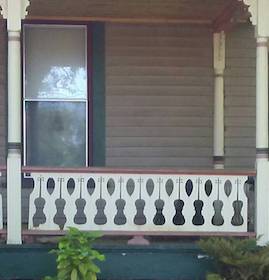
I was thinking while fishing one day
There must be some better way
I could build a bridge like the New Yorkers do
Across that Oconee River between me and you
Repeat Chorus
We got those extra minutes we’ve been waiting for
‘Cause I built a path straight to your door
Soon I’ll ask you to be my bride
Then you can stay with me over on this side
Repeat Chorus
Hobble the Dog
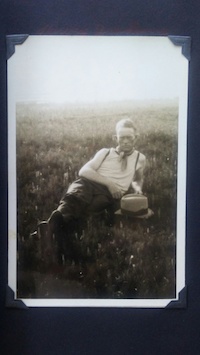
We bought a plant called a dog hobble. I read that the plant is called that because it is poisonous to dogs. The line “wind the clock to wound the hound” popped into my mind and being a lover of words, I couldn’t resist the interplay of “wind”, “wound”, and “hound”. This song came out after some reading about Reconstruction in the South. I am very thankful that every day in my town I see people of different races and cultures living side by side, interacting with each other, getting along with each other, and sharing a sense of community together. Here’s hoping that we will all heal with time and that love and learning will lead to peace and understanding among all people of all cultures everywhere.
Lyrics:
Wind the clock to wound the hound
‘Ol Reconstruction Blue
Started doing something, then decided to be through
Be careful how you’re listening, someone might lie to you
Gotta wind the clock to wound the hound
‘Ol Reconstruction Blue
Gotta hobble the dog, hobble the dog
Gonna hobble the dog, hobble the dog
From mother to daughter these songs are handed down
To lawnmower ghosts in a birdshot widow’s town
Another bitter, hating coward inherits the cold, cold ground
From mother to daughter these songs are handed down
Repeat Chorus
Still some can’t feel the heat all laid up in the shade
Here’s your persimmon buttons and a scarifying blade
But love, nurture and knowledge are the prayers being prayed
So the truth will be the fire and we’ll all have it made
If we hobble the dog, hobble the dog
Gotta hobble the dog, hobble the dog
Wind the clock to wound the hound
‘Ol Reconstruction Blue
Started doin’ something, then decided to be through
Be careful how you’re listening, someone might lie to you
Gotta wind the clock to wound the hound
‘Ol Reconstruction Blue
Miss Minnie
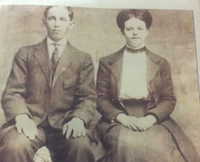
Aside from the chorus, most of the words in the song were quoted verbatim from a letter which was written in 1887. The letter was found in the wall of an old house in Elbert County, Georgia during remodeling. The letter’s deteriorated condition makes it impossible to read the name of the love sick suitor who wrote it to Miss Minnie so long ago. Unfortunately, I can’t read Miss Minnie’s last name either so it has been really hard to figure out who these people actually were. Did he change her mind or did she marry his competitor in Harmony Grove (now Commerce, Georgia)? Why did Miss Minnie hide the letter in the wall? Still looking for clues…
Lyrics:
Miss Minnie your letter from the sixth came to Franklin yesterday
It was forwarded to this place from Clayton
I can assure you it was highly appreciated
I’m glad that you had such a jolly time in Elberton
I heard you are to be married to someone in Harmony Grove
This coming November
You can imagine what a time I am having, we leave here for Asheville today
Merely to see the country
Miss Minnie won’t you change your mind?
If you can read between the lines you can see I’m dyin’
The Pine trees smell like love
Down where the Broad River flows
The Pine trees smell like love
There are things you will never know
The Pine trees smell like love
And that night that I carried you from the hall?
Have you forgotten it all, Miss Minnie?
I would give you a description of my trip, but would tire you so will wait
Until I see you
We six boys and young ladies took a ride in a wagon yesterday and had
Nothing but hay in the bottom
Miss Minnie won’t you change your mind?
If you can read between the lines you can see I’m dying
The Pine trees smell like love
Down where the Broad River flows
The Pine trees smell like love
There are things you will never know
The Pine trees smell like love
I will never tease you anymore about a sweet letter
I declare I can do better, Miss Minnie
You have a right to know I would enjoy a visit most anywhere better
If you could be there
I heard you are to be married to someone in Harmony Grove
The Pine trees smell like love
The Pine trees smell like love
The Pine trees smell like love
Savannah River Boat Man

Petersburgh pole boats were extensively used along the upper Savannah River to get bales of cotton to market in Augusta until the late 19th century. Working on one of these boats could be strenuous and sometimes dangerous but also exciting and profitable for adventurous young men of the day. The river is the border between Georgia and South Carolina so captains would shout the names of the states to tell the men which direction to steer the boat.
I was reading a book of Georgia history and it contained an interview with one of the last if not THE last man who piloted the cotton flatboats on the river. It was a GREAT interview. I had no idea this was done until I moved to this part of Georgia. He said it was fun times for them when the river was flowing well and they’d get to Augusta in no time, but when it was dry it was an entirely different story. Likewise, when the river was really high they had to fight a lot more current going home. He said on the hard days he would swear that that was his last trip and he was just going to stick to farming but then he’d start thinking about those pretty girls in Augusta and how much fun they all had sometimes, so he’d find himself doing it again. He said they had a banjo picker on board who would serenade the ladies in the towns beside the river along the way so that they would let them have some fresh vegetables out of their garden and that sometimes they would also “borrow” a chicken to eat along the way. He said that things got really wild in Augusta sometimes and someone might get thrown in jail but that none of the fellas on the boat would tell on each other when they got home. They all lived with a pact of secrecy about what happened on the trips and if you did tell you might get yourself killed. Sometimes there would be a high river and dangerous rocks and there was the possibility that the boat would crash into one and break up. If the captain saw that this was going to happen he’d yell, “Every man for himself and God for all!”, which meant they should abandon ship. He said if this happened your best bet was to grab on to a bale of cotton because they would float you to shore. Sometimes those bales floated all the way to Augusta and if the folks there saw them they would fish them out of the river because they could tell who they belonged to by a special mark on them; the person who sent them down the river could still get paid for their cotton.
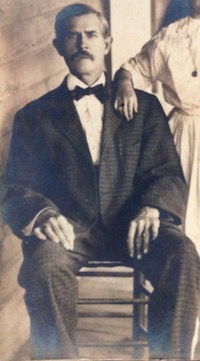
I’ve mentioned a Petersburg bugle in a couple of the songs on this recording. Petersburg, Georgia is now underneath Clarks Hill Lake. It used to be a town in the fork of the Savannah and Broad Rivers that first was a center for tobacco inspection and then to a lesser degree for cotton. At its height of prosperity between 1800 and 1810, it was the third largest city in Georgia. The Petersburg bugle was a long, thin horn that was blown into to let the people of the town know if a boat was coming into town with supplies or if a boat was loaded up and ready for a crew to assemble and take it down river to Augusta.
Lyrics:
When he hears the sound of a Petersburg Bugle he starts feeling like he’s gonna win
Talking 75 feet, drawing 15 inches with 60 bales and 8 or 10 men
Two days from now he’ll back in Augusta lovin’ sweet Sally again
He’ll get it while he can
Savannah River boat man
He’ll get it while he can
Savannah River boat man
When it’s a week of hard pushing in the heat of summer
And them mosquitos are beginning to swarm
Or when there’s ice on the pole and ice on his hat brim
He swears he’ll go back to the farm
But when he remembers high water and them gals downstream
He thinks once more won’t do him no harm
Repeat Chorus
What happens on the boat stays on the boat
Dead men tell no tales
He might borrow a chicken, do some banjo pickin’
Laid up with a lady or locked up in jail, but it the captain says…
“Every man for himself and God for all!”
You better grab yourself a bale
And get it while you can
Savannah River boat man
He’ll get it while he can
Savannah River boat man
He’ll get it while he can- Georgia!
Savannah River boat man- Carolina!
He’ll get it while he can- Georgia!
Savannah River boat man- Carolina!
Dancing Man
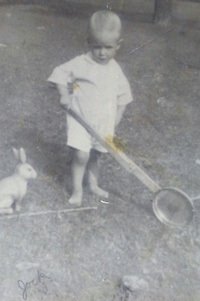
The lyrics to this song are made of my childhood memories of my dad who was born in Jackson County, Georgia in 1929.
I had written “make dancing man” on my to-do list. We had recently seen a piece of folk art that was a man made of wood attached to the end of a fishing rod who danced on a board when the rod was jiggled. We thought it would be neat to have one of these that we could make dance while we were playing fiddle tunes out somewhere. Well, I never made the dancing man on my list but I did write this song when I looked at my to-do list one day. It started out as a poem. I kept remembering things my dad liked or at least had around when I was a kid and I jotted them down, and it kind of turned into poem form. Then it occurred to me that it looked like a recipe, so then I started playing with the idea that it was a recipe for a voodoo-like potion to conjure up my dad like a genie and he’d be happy so he’d dance when I conjured him up. Presto! The song was born. I like to think of my dad coming to life and doing a little jig with this combination of things that remind me of him.
Lyrics:
I have to make a dancing man
With grave yard dirt from an old beer can,
Finger nails and apple peels, an old tackle box and a rod and reel,
An orange and white bobber, some chunks of lead,
That emery wheel out in the tool shed
I have to make a dancing man
With graveyard dirt from an old beer can
I have to make a dancing man
With two pig bones from the barbecue stand
With shotgun shells from Christmas Day and ashes from an old Ford truck’s ash tray
Cowboy boots, a plaid shirt and vest,
Duct tape and styrofoam ice chest
I have to make a dancing man
With two pig bones from the barbecue stand
I have to make a dancing man
With Conquer Root if I can
With reading glasses and a bottle of Seven, an old C.B. turned up to eleven
With a big stack of pallets and an old hemp rope,
A typewriter ribbon and manila envelope
I have to make a dancing man
With Conquer Root if I can
A pack of Kool Milds and banana peels to smoke,
A cold Busch beer and a couple dirty jokes
Now all I need are some notes from my hand
And that’s the way I’ll conjure up a dancing man
Now all I need are some notes from my hand
And that’s the way I’ll conjure up a dancing man
Resurrection Fern
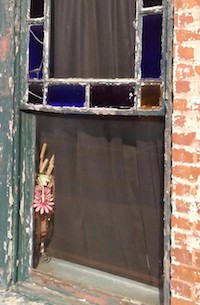
Our part of Georgia has many ghost towns and much unused farm land. Hopefully this land has recovered now from all the cotton farming that went on during those years when cotton was King. A new and improved profitable agrarian age of sustainable, organic agriculture would be wonderful to see here.
Resurrection ferns grow on hardwood trees all over the southeastern US. They are interesting in that they can lose up to 97% of their water and look completely dead, but then just a little bit of water will make it open up and turn bright green again within 24 hours. Scientists estimate they could potentially live a hundred years without water and still come alive if they got a little rain. Learning about this fern that I see all over the place where I live, coupled with reading about Jesus’ resurrection in the Bible, lead to this song.
Lyrics:
Cracks in the bricks, cracks in the clay
Red dirt bone dry awaits the end of the age
When the green life will be revealed
All things must be fulfilled
Oh foolish ones who let love’s fountain run dry
Will wet their new tongues with rain from on high
So the green life will be revealed
All things must be fulfilled
Like a Resurrection Fern, Resurrection Fern
Still holding on to something strong
Still holding on
Why are you weeping?
Tend my sheep
What is that to you?
Follow me
Like a Resurrection Fern
Deadwyler’s Ferry
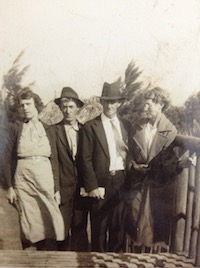
Long ago, my great-grandmother’s family ran a ferry that crossed the Broad River. One of the roads leading to it connected it to Paoli, Georgia, home of New Hope Presbyterian Church founded in 1788. There was once a tradition of camp meeting revivals where music, merriment, and romance could often be found along with salvation.
I mention a “croker sack” in this song. I heard my mom use that term many times during her life. I learned that it was a bag of course material like burlap. One theory is that crocus bulbs used to get shipped in burlap bags that people would reuse so they were called “crocus sacks” and then dialect turned that name into “croker sack”. Another theory is that burlap bags were used to hold frogs that were harvested because they could breath through the material and could be kept moist until they could be sold for their frog legs to be used as food. The frogs obviously were croaking so you get the term “croker sack”. I also learned that there is a fine type of sand paper called “crocus paper”, so maybe the rough texture of the bags and the rough texture of the paper lead to the term “croker sack”.
Lyrics:
We’re going down to Deadwyler’s Ferry
Hey hey a fiddle and a fire
If we can get across, then we’re gonna get merry
Hey hey a fiddle and a fire
We’re going down to Deadwyler’s Ferry
Hey hey
If we can get across, then we’re gonna get merry
Hey hey a fiddle and a fire
Hitch that mule to head to Paoli, wrap that banjo in a croker sack
That New Hope’ll get us feelin’ so holy we might not ever want to come back
We’re going down to Deadwyler’s Ferry
Hey hey a fiddle and a fire
A little apple jack and we’ll feel merry
Hey hey a fiddle and a fire
We’re going down to Deadwyler’s Ferry
Hey hey
A little apple jack and we’ll feel merry
Hey hey a fiddle and a fire
Good preachin’ all day’s gonna save our souls, good music all night’s gonna make us dance
November’s comin’ and it’s gonna get cold so it might be spring before we get another chance
We’re going down to Deadwyler’s Ferry
Hey hey a fiddle and a fire
Me and my gal we’re gonna make merry
Hey hey a fiddle and fire
We’re going down to Deadwyler’s Ferry
Hey hey
Me and my gal we’re gonna make merry
Hey hey a fiddle and a fire
Repeat 1st Chorus
Geneva Moon
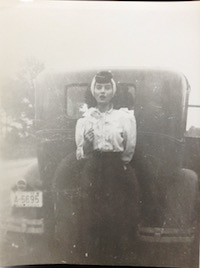
I was outside picking the tenor banjo and looking at the moon the night after my mother died when this tune came to me, so I named it after my mom. It’s a proper, short, and sweet little tune for a proper, short, and sweet little Georgia lady.
It somehow reminds me of an Irish tune called “Gypsy Princess” that she liked to hear me play for her on the mandolin.
This album is dedicated to:
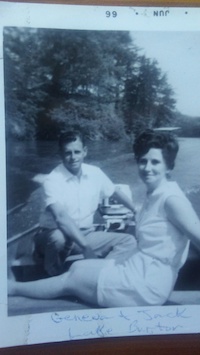
Jenny and Jack — Thanks for all the stories about Georgia that you shared through the years.
— Tim
© 2019 Clay Babies

This website was created and hosted for free using WordPress, so as an unfortunate consequence of choosing the ‘free’ plan, there are ads automatically selected by WordPress. We have no control over this unless we pay. We are sorry for this annoyance and recommend you use ad and cookie blockers on your Internet browser. We do not benefit in any way from the ads or cookies other than being able to use WordPress to put our content onto the Internet.
